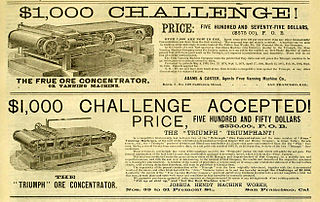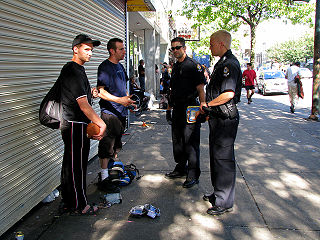A monopoly, as described by Irving Fisher, is a market with the "absence of competition", creating a situation where a specific person or enterprise is the only supplier of a particular thing. This contrasts with a monopsony which relates to a single entity's control of a market to purchase a good or service, and with oligopoly and duopoly which consists of a few sellers dominating a market. Monopolies are thus characterised by a lack of economic competition to produce the good or service, a lack of viable substitute goods, and the possibility of a high monopoly price well above the seller's marginal cost that leads to a high monopoly profit. The verb monopolise or monopolize refers to the process by which a company gains the ability to raise prices or exclude competitors. In economics, a monopoly is a single seller. In law, a monopoly is a business entity that has significant market power, that is, the power to charge overly high prices, which is associated with unfair price raises. Although monopolies may be big businesses, size is not a characteristic of a monopoly. A small business may still have the power to raise prices in a small industry.
An oligopoly is a market in which control over an industry lies in the hands of a few large sellers who own a dominant share of the market. Oligopolistic markets have homogenous products, few market participants, and inelastic demand for the products in those industries. As a result of their significant market power, firms in oligopolistic markets can influence prices through manipulating the supply function. Firms in an oligopoly are also mutually interdependent, as any action by one firm is expected to affect other firms in the market and evoke a reaction or consequential action. As a result, firms in oligopolistic markets often resort to collusion as means of maximising profits.

A cartel is a group of independent market participants who collude with each other as well as agreeing not to compete with each other in order to improve their profits and dominate the market. A cartel is an organization formed by producers to limit competition and increase prices by creating artificial shortages through low production quotas, stockpiling, and marketing quotas. Cartels can be vertical or horizontal but are inherently unstable due to the temptation to defect and falling prices for all members. Additionally, advancements in technology or the emergence of substitutes may undermine cartel pricing power, leading to the breakdown of the cooperation needed to sustain the cartel. Cartels are usually associations in the same sphere of business, and thus an alliance of rivals. Most jurisdictions consider it anti-competitive behavior and have outlawed such practices. Cartel behavior includes price fixing, bid rigging, and reductions in output. The doctrine in economics that analyzes cartels is cartel theory. Cartels are distinguished from other forms of collusion or anti-competitive organization such as corporate mergers.
Purchasing power parity (PPP) is a measure of the price of specific goods in different countries and is used to compare the absolute purchasing power of the countries' currencies. PPP is effectively the ratio of the price of a market basket at one location divided by the price of the basket of goods at a different location. The PPP inflation and exchange rate may differ from the market exchange rate because of tariffs, and other transaction costs.

In the United States, antitrust law is a collection of mostly federal laws that regulate the conduct and organization of businesses in order to promote competition and prevent unjustified monopolies. The three main U.S. antitrust statutes are the Sherman Act of 1890, the Clayton Act of 1914, and the Federal Trade Commission Act of 1914. These acts serve three major functions. First, Section 1 of the Sherman Act prohibits price fixing and the operation of cartels, and prohibits other collusive practices that unreasonably restrain trade. Second, Section 7 of the Clayton Act restricts the mergers and acquisitions of organizations that may substantially lessen competition or tend to create a monopoly. Third, Section 2 of the Sherman Act prohibits monopolization.
Price fixing is an anticompetitive agreement between participants on the same side in a market to buy or sell a product, service, or commodity only at a fixed price, or maintain the market conditions such that the price is maintained at a given level by controlling supply and demand.
Collusion is a deceitful agreement or secret cooperation between two or more parties to limit open competition by deceiving, misleading or defrauding others of their legal right. Collusion is not always considered illegal. It can be used to attain objectives forbidden by law; for example, by defrauding or gaining an unfair market advantage. It is an agreement among firms or individuals to divide a market, set prices, limit production or limit opportunities. It can involve "unions, wage fixing, kickbacks, or misrepresenting the independence of the relationship between the colluding parties". In legal terms, all acts effected by collusion are considered void.

A price is the quantity of payment or compensation expected, required, or given by one party to another in return for goods or services. In some situations, especially when the product is a service rather than a physical good, the price for the service may be called something else such as "rent" or "tuition". Prices are influenced by production costs, supply of the desired product, and demand for the product. A price may be determined by a monopolist or may be imposed on the firm by market conditions.
Anti-competitive practices are business or government practices that prevent or reduce competition in a market. Antitrust laws ensure businesses do not engage in competitive practices that harm other, usually smaller, businesses or consumers. These laws are formed to promote healthy competition within a free market by limiting the abuse of monopoly power. Competition allows companies to compete in order for products and services to improve; promote innovation; and provide more choices for consumers. In order to obtain greater profits, some large enterprises take advantage of market power to hinder survival of new entrants. Anti-competitive behavior can undermine the efficiency and fairness of the market, leaving consumers with little choice to obtain a reasonable quality of service.
Decartelization is the transition of a national economy from monopoly control by groups of large businesses, known as cartels, to a free market economy. This change rarely arises naturally, and is generally the result of regulation by a governing body with monopoly of power to decide what structures it likes.

A fence, also known as a receiver, mover, or moving man, is an individual who knowingly buys stolen goods in order to later resell them for profit. The fence acts as a middleman between thieves and the eventual buyers of stolen goods who may not be aware that the goods are stolen.

Bid rigging is a fraudulent scheme in a procurement action which enables companies to submit non-competitive bids. It can be performed by corrupt officials, by firms in an orchestrated act of collusion, or by officials and firms acting together. This form of collusion is illegal in most countries. It is a form of price fixing and market allocation, often practiced where contracts are determined by a call for bids, for example in the case of government construction contracts. The typical objective of bid rigging is to enable the "winning" party to obtain contracts at uncompetitive prices. The other parties are compensated in various ways, for example, by cash payments, or by being designated to be the "winning" bidder on other contracts, or by an arrangement where some parts of the successful bidder's contract will be subcontracted to them. In this way, they "share the spoils" among themselves. Bid rigging almost always results in economic harm to the agency which is seeking the bids, and to the public, who ultimately bear the costs as taxpayers or consumers.
In criminal law, a conspiracy is an agreement between two or more people to commit a crime at some time in the future. Criminal law in some countries or for some conspiracies may require that at least one overt act be undertaken in furtherance of that agreement, to constitute an offense. There is no limit to the number participating in the conspiracy and, in most countries, the plan itself is the crime, so there is no requirement that any steps have been taken to put the plan into effect. For the purposes of concurrence, the actus reus is a continuing one and parties may join the plot later and incur joint liability and conspiracy can be charged where the co-conspirators have been acquitted or cannot be traced. Finally, repentance by one or more parties does not affect liability but may reduce their sentence.

In economics, competition is a scenario where different economic firms are in contention to obtain goods that are limited by varying the elements of the marketing mix: price, product, promotion and place. In classical economic thought, competition causes commercial firms to develop new products, services and technologies, which would give consumers greater selection and better products. The greater the selection of a good is in the market, the lower prices for the products typically are, compared to what the price would be if there was no competition (monopoly) or little competition (oligopoly).

Possession of stolen goods is a crime in which an individual has bought, been given, or acquired stolen goods.

Pre-trial detention, also known as jail, preventive detention, provisional detention, or remand, is the process of detaining a person until their trial after they have been arrested and charged with an offence. A person who is on remand is held in a prison or detention centre or held under house arrest. Varying terminology is used, but "remand" is generally used in common law jurisdictions and "preventive detention" elsewhere. However, in the United States, "remand" is rare except in official documents and "jail" is instead the main terminology. Detention before charge is commonly referred to as custody and continued detention after conviction is referred to as imprisonment.
United Kingdom competition law is affected by both British and European elements. The Competition Act 1998 and the Enterprise Act 2002 are the most important statutes for cases with a purely national dimension. However, prior to Brexit, if the effect of a business' conduct would reach across borders, the European Commission has competence to deal with the problems, and exclusively EU law would apply. Even so, the pre-Brexit section 60 of the Competition Act 1998 provides that UK rules are to be applied in line with European jurisprudence. Like all competition law, that in the UK has three main tasks.
Illinois Brick Co. v. Illinois, 431 U.S. 720 (1977), is a United States Supreme Court case that involved issues concerning statutory standing in antitrust law.
United States v. Socony-Vacuum Oil Co., 310 U.S. 150 (1940), is a 1940 United States Supreme Court decision widely cited for the proposition that price-fixing is illegal per se. The Socony case was, at least until recently, the most widely cited case on price fixing.
Economists and marketers use the Search, Experience, Credence (SEC) classification of goods and services, which is based on the ease or difficulty with which consumers can evaluate or obtain information. These days most economics and marketers treat the three classes of goods as a continuum. Archetypal goods are:







